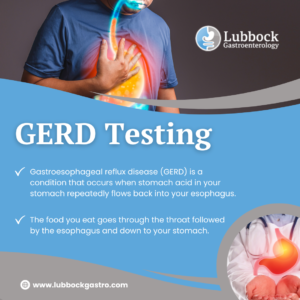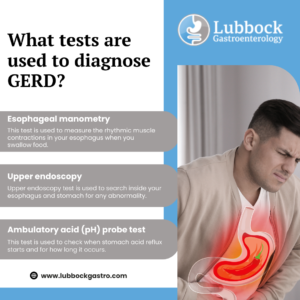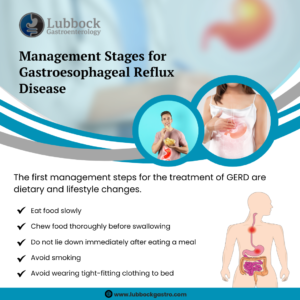GERD Testing in Lubbock, Tx

GERD Testing in Lubbock, Tx
Gastroesophageal reflux disease (GERD) is a condition that occurs when stomach acid in your stomach repeatedly flows back into your esophagus.
The food you eat goes through the throat followed by the esophagus and down to your stomach.
Acid reflux can irritate the lining of your esophagus, causing discomfort such as heartburn, regurgitation of food, upper abdominal pain, chest pain, and trouble swallowing.
It can also cause the lining of your esophagus to become inflamed.
Causes of GERD
GERD is caused by the frequent flow of stomach acid into the esophagus.
How GERD Happens
When you swallow food or liquid, a circular band of muscle around the bottom of your esophagus called the lower esophageal sphincter relaxes to allow the food or liquid to flow into your stomach.
The sphincter then closes again after the food or liquid has passed through.
Stomach acid can flow back into your esophagus if the sphincter does not relax as it should or it weakens, causing GERD.
How do you know if you have GERD?
There are certain signs and symptoms that may show that you have GERD. Consult with your doctor if you’re experiencing any of these signs and symptoms. These symptoms include:
- Heartburn that occurs usually after eating
- Heartburn that may be worse at night or while lying down
- Regurgitation of food or liquid
- Upper abdominal pain
- Chest pain
- Trouble swallowing
- Having a sensation of a lump in your throat
- Ongoing cough when lying down at night
- Inflammation of the vocal cords
- New or worsening asthma
What tests are used to diagnose GERD?

What tests are used to diagnose GERD
The various tests that can be used to diagnose GERD include:
Esophageal manometry
This test is used to measure the rhythmic muscle contractions in your esophagus when you swallow food.
Upper endoscopy
Upper endoscopy test is used to search inside your esophagus and stomach for any abnormality. A sample of tissue (biopsy) may be collected during the test and taken to the lab for examination.
Ambulatory acid (pH) probe test
This test is used to check when stomach acid reflux starts and for how long it occurs. During the test, a monitor will be placed inside your esophagus.
The monitor is connected to a small computer that you will need to wear around your waist or strapped over your shoulder.
Treatment and Medication Options for GERD
Nonprescription medications are the first treatment options for GERD. Prescription medications are recommended if your condition doesn’t improve within a few weeks.
Nonprescription Medications
Nonprescription medications for the treatment of GERD include:
- Medications to reduce acid production (histamine H-2 blockers)
These medications help to reduce acid production in the stomach. They include cimetidine, famotidine, and nizatidine. H-2 blockers may reduce acid production from the stomach for up to 12 hours.
- Antacids
Antacids neutralize stomach acid. Antacids that contain calcium carbonate may provide quick relief. However, if your esophagus is inflamed and damaged by stomach acid, using antacids alone won’t heal it.
- Proton pump inhibitors
These are medications that block acid production in the stomach. They are stronger acid blockers than H-2 blockers. These medications include lansoprazole, omeprazole, and esomeprazole.
Prescription Medications
Prescription medications for the treatment of GERD include:
- Prescription-strength proton pump inhibitors
These medications should be used only when prescribed by your doctor. Just like the nonprescription proton pump inhibitors, these prescription proton pump inhibitors block acid production and also heal the esophagus.
They include esomeprazole, lansoprazole, omeprazole, pantoprazole, rabeprazole, and dexlansoprazole.
- Prescription-strength H-2 blockers
These medications help to reduce acid production in the stomach. They should be used only with a prescription from a doctor. Prescription-strength H-2 blockers include famotidine and nizatidine.
Management Stages for Gastroesophageal Reflux Disease

Management Stages for Gastroesophageal Reflux Disease
The first management steps for the treatment of GERD are dietary and lifestyle changes. Certain foods can make gastroesophageal reflux worse.
These foods should be avoided. Also, people who are overweight are at higher risk of experiencing gastroesophageal reflux. People who are overweight or obese should lose weight.
Other lifestyle changes that can help stop or reduce gastroesophageal reflux include:
- Elevate the head of your bed or using a pillow when sleeping
- Eat food slowly
- Chew food thoroughly before swallowing
- Do not lie down immediately after eating a meal
- Do not foods and drinks that can trigger gastroesophageal reflux
- Avoid smoking
- Avoid wearing tight-fitting clothing to bed
If dietary and lifestyle changes don’t work, you can then proceed to the second management step, which is taking medication.
You can start with nonprescription medications for GERD. Consult with your doctor to get a prescription for prescription-strength medications if nonprescription medications don’t work.
FAQ
How to Choose the Right GERD Diet
You should avoid foods that can worsen GERD. Fatty foods, spicy foods, fried foods, acidic foods, chocolate, caffeine, and carbonated drinks are foods and drinks that can trigger or worsen GERD.
Eat foods that can help improve GERD and not trigger it. The right GERD diets include:
- Vegetables such as leafy greens, carrots, garlic, cabbage, lettuce, sweet potatoes, broccoli, and green beans.
- Non-citrus fruits.
- Whole grains such as brown rice.
- Lean meat, skinless poultry, fish, eggs and tofu.
- Low-fat or fat-free dairy products.
How Changes in Body Weight Affect GERD
People who are obese or overweight are more prone to GERD. This is because the fat around the stomach squeezes the stomach which causes more fluid to travel upward into the esophagus.
The fat around the stomach also exerts increased pressure on the stomach which causes the sphincter that sits between the stomach and the esophagus to relax, thereby allowing the flow of stomach acid into the esophagus.
People who are obese or overweight are advised to lose weight and maintain a healthy body weight to reduce their risks of developing GERD.
Ways to Avoid Triggering GERD Symptoms
There are various ways you can avoid triggering GERD and its symptoms. These include:
- Lose weight
- Do not take foods or drinks that can trigger GERD
- Eat foods slowly and in smaller portions
- Chew foods thoroughly before swallowing
- Don’t lie down immediately after eating
- When you want to lie down, start by lying on your left side
- Elevate your head when lying down by elevating the head of your bed
- Avoid taking medications that can trigger GERD
- Reduce your alcohol intake
- Quit smoking
- Avoid tight-fitted clothes and wear loose clothes
When should I call my healthcare provider?
Call your healthcare provider when you start to experience frequent or severe symptoms of GERD.
Can GERD be cured permanently?
Earlier stages of GERD can be cured permanently with effective treatments. Earlier stages of GERD are easier to treat than the latter stages.
It is important to get timely treatment before your GERD progresses into stage 4. This is because if GERD progresses to stage 4, it can be difficult or impossible to cure permanently.
What’s the difference between GERD and acid reflux?
Acid reflux that occurs repeatedly is known as GERD. GERD is a more severe or chronic form of acid reflux.
Lubbock Gastroenterology: Best Gastroenterologist for GERD Test in Lubbock, Texas
Before seeking treatment for GERD, it is important that you get an accurate diagnosis of your condition. Getting an accurate diagnosis or test will help you get the best treatment.
If you’re located in Lubbock, you should get your GERD testing at Lubbock Gastroenterology.
Lubbock Gastroenterology is headed by Dr. Sameer Islam, a trained and experienced Gastroenterologist. He conducts various tests that involve the gastrointestinal tract, including GERD testing.
You can be sure to get the most accurate results for your GERD testing to enable you get the best treatment.
Book an Appointment today with Dr. Sameer Islam to get GERD Test.
